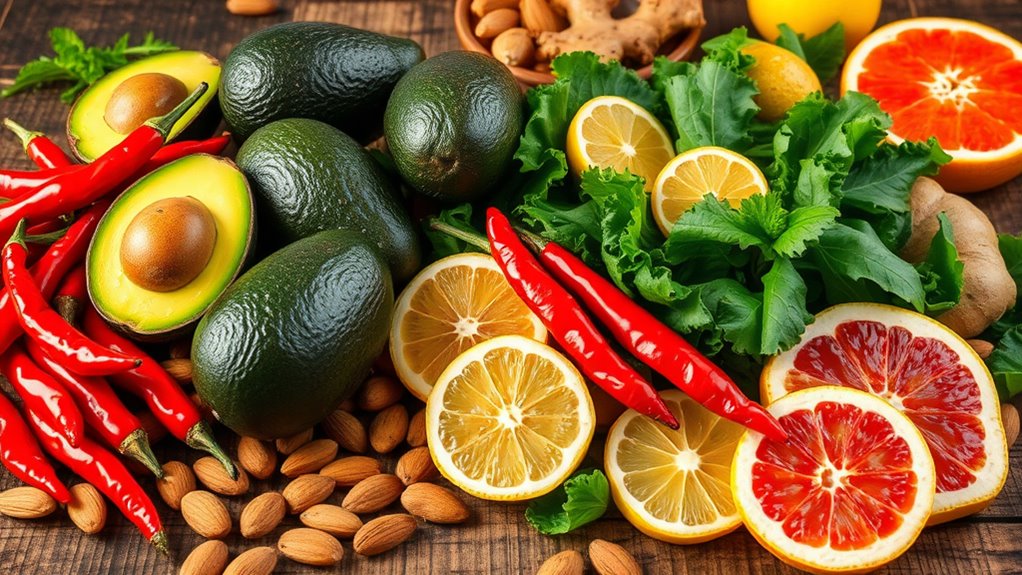To boost your metabolism, incorporate green tea, lean proteins, spicy foods, whole grains, and healthy fats into your diet. Green tea's catechins and caffeine work together to enhance fat oxidation. Lean proteins, like chicken and lentils, keep you full and support muscle growth, while spicy foods containing capsaicin can rev your metabolic rate. Whole grains, such as quinoa and brown rice, provide sustained energy and regulate digestion. Don't forget healthy fats, like those in avocados and coconut oil, which are essential for metabolic health. Together, these foods can elevate your energy levels and optimize your diet, leading to further insights ahead.
Key Takeaways
- Green Tea: Rich in catechins and caffeine, it enhances metabolism and fat oxidation, supporting weight management.
- Lean Proteins: Foods like chicken, fish, and legumes promote satiety and muscle growth, optimizing metabolism and aiding in weight control.
- Spicy Foods: Capsaicin found in spicy foods can elevate metabolic rate and boost fat oxidation for effective energy use.
- Whole Grains: Nutrient-dense options like brown rice and quinoa provide fiber, regulating digestion and sustaining energy levels throughout the day.
- Healthy Fats: Incorporate sources like avocados and coconut oil, which support metabolism and overall health when consumed in moderation.
Green Tea

Green tea is often hailed as a powerhouse among metabolism-boosting foods, and for good reason. This beloved beverage not only warms your cup but also packs a punch when it comes to health benefits. One major advantage of green tea lies in its high antioxidant content, particularly catechins, which help combat oxidative stress in your body. By neutralizing free radicals, these antioxidants support overall health and may contribute to weight management.
Additionally, green tea contains caffeine, albeit in lower amounts than coffee. This caffeine content can enhance your metabolism by increasing your energy expenditure, allowing you to burn more calories throughout the day. Studies have shown that the combination of caffeine and catechins can lead to a significant boost in fat oxidation, especially during exercise.
So, if you're looking for a simple way to support your metabolism while enjoying a soothing drink, green tea might just be your best friend. Incorporating it into your routine can complement a comprehensive program like Adaptive Body Boost(https://example.com) that offers tailored meal plans and exercise guidance.
It's also essential to remember that while green tea can offer these benefits, it shouldn't be seen as a miracle solution. Incorporating it into a balanced diet alongside regular physical activity will yield the best results. Plus, sharing a cup with friends or family can enhance your sense of belonging, making your health journey a shared experience.
Lean Proteins
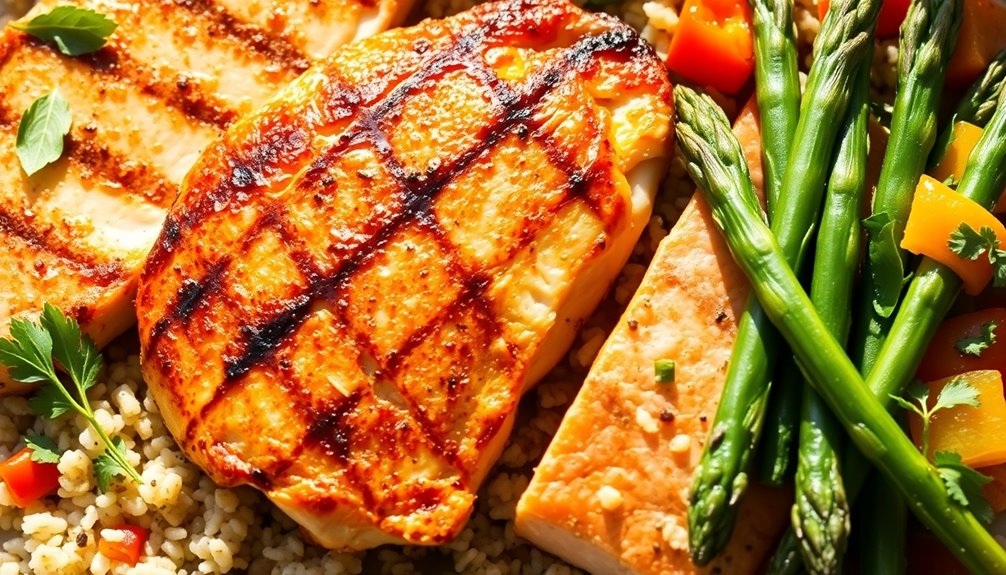
Incorporating lean proteins into your diet can greatly enhance your metabolism and support weight management. Lean proteins, such as chicken breast, turkey, fish, and plant-based proteins like lentils, chickpeas, and quinoa, aren't only nutritious but also help you feel fuller longer. This satiety can lead to reduced overall calorie intake, aiding in weight loss or maintenance.
Consuming lean proteins requires some attention to timing meals. Consuming protein-rich foods at strategic points throughout the day can optimize muscle repair and growth, especially if you're physically active. Aim to include protein in each meal and snack, which can keep your energy levels steady and prevent those mid-afternoon slumps.
Including a variety of protein sources ensures you're getting a full spectrum of amino acids, which are essential for numerous bodily functions. Additionally, plant-based diet options provide significant health benefits while being low in saturated fat and cholesterol, making them an excellent choice for enhancing metabolism.
Plant-based proteins are particularly beneficial if you're looking to reduce your intake of saturated fats while still meeting your protein needs. They often come with added fiber, which further supports healthy digestion and can enhance metabolic processes.
Spicy Foods
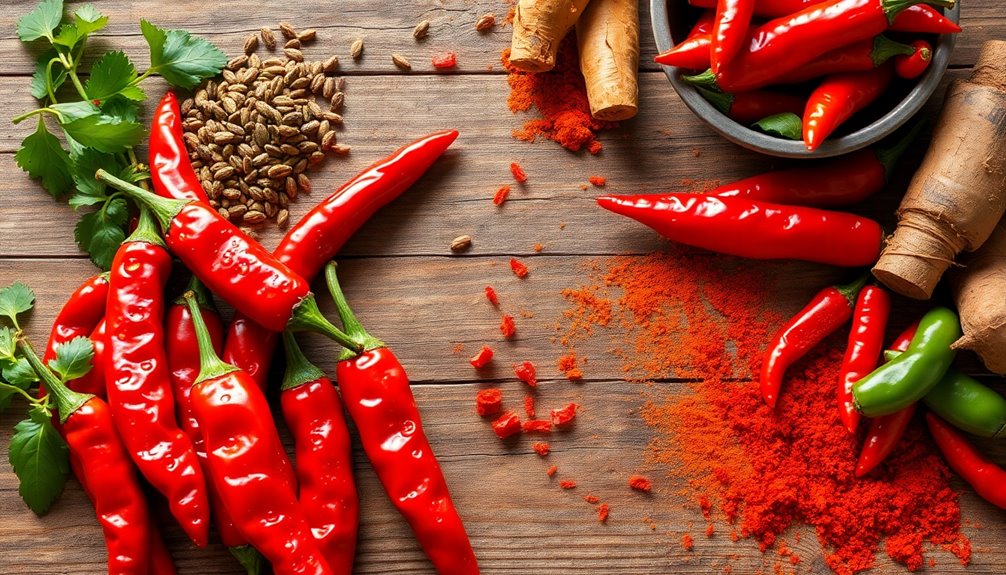
When considering this, it's crucial to highlight that
Spicing up your meals can do more than just add flavor; it can also give your metabolism a boost. One of the main players in spicy foods is capsaicin, the compound that gives chili peppers their fiery heat. Research shows that capsaicin benefits your metabolism by increasing your body's calorie burn. When you eat spicy foods, your body works a little harder to process the heat, leading to a temporary spike in metabolic rate.
Incorporating spicy ingredients into your meals can be an enjoyable way to enhance not just your dishes, but also your overall health. Whether it's adding jalapeños to your tacos or sprinkling red pepper flakes on your pasta, these small changes can make a significant impact. Some studies suggest that the heat from capsaicin may even promote fat oxidation, allowing your body to utilize stored fat as energy more effectively. Additionally, adopting a plant-based diet can further enhance your metabolism and overall health benefits.
Nevertheless, while spicy foods can help rev up your metabolism, balance is key. Overdoing the heat can lead to digestive discomfort for some, so listen to your body. If you're new to spicy foods, start small and gradually increase the heat as your palate adjusts.
Whole Grains
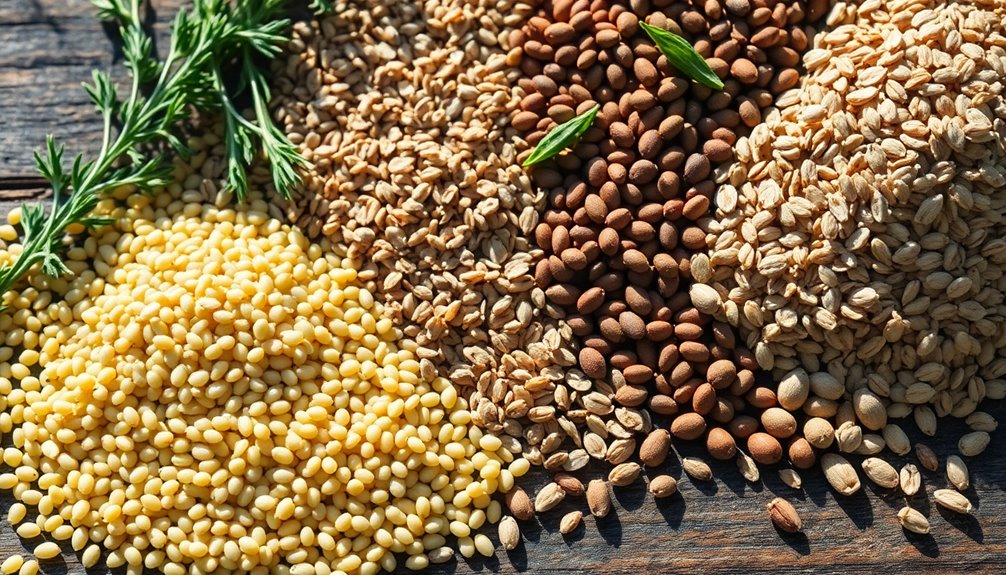
Whole grains are a powerhouse of nutrition that can greatly enhance your metabolism. When you choose whole grains like brown rice, quinoa, and whole wheat bread, you're fueling your body with essential nutrients and fiber. The fiber benefits of whole grains are particularly significant; they help regulate digestion and keep you feeling full longer. This can prevent overeating and help you maintain a healthy weight.
One of the key aspects of whole grains is their ability to promote slow digestion. This means your body processes them gradually, providing sustained energy throughout the day. Unlike refined grains, which can lead to quick spikes in blood sugar, whole grains maintain steadier energy levels. This slow digestion encourages your body to burn calories more efficiently, supporting your metabolic rate.
Incorporating whole grains into your diet doesn't have to be complicated. Start your day with oatmeal topped with fresh fruits, or switch to whole grain pasta for dinner. You might be surprised at how easily you can make these small changes to your meals. Additionally, managing underlying conditions like high blood pressure can further enhance your overall health and benefit your metabolic function.
Not only will you enjoy the delicious flavors, but you'll also become part of a community focused on health and wellness.
Healthy Fats
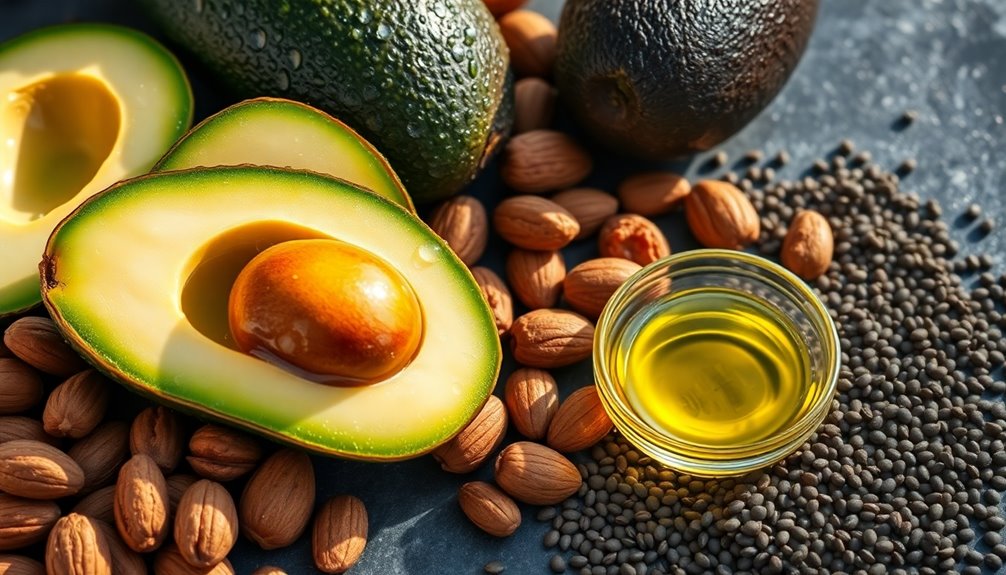
Healthy fats are crucial for supporting your metabolism and overall health. Incorporating these fats into your diet can enhance your energy levels and help you feel satisfied longer. One of the standout options is avocado. The advantages of avocado are numerous; they're loaded with monounsaturated fats that support heart health and can even help reduce inflammation. Plus, avocados are rich in fiber, which aids digestion and keeps you feeling full, making them an excellent addition to any meal.
Another fantastic healthy fat is coconut oil. The uses of coconut oil go beyond just cooking; it contains medium-chain triglycerides (MCTs), which are metabolized differently than other fats. MCTs can boost your metabolism and increase fat burning, providing a quick source of energy.
You might also consider using coconut oil in your baking or as a spread to enhance flavor while reaping its health benefits.
Including these healthy fats in your diet can help you maintain a balanced intake of nutrients while supporting your metabolic rate. It's important to embrace a variety of fats to guarantee you're getting a full spectrum of nutrients. Remember, moderation is key. So, whether you're spreading avocado on toast or cooking with coconut oil, you're not just adding flavor; you're fueling your body in a way that promotes a healthy metabolism. By making these choices, you're taking steps toward a healthier lifestyle, and that's something to feel good about! Additionally, incorporating healthy fats can complement your efforts in programs like the Smoothie Diet, which includes versatile recipes that promote weight loss and health improvements.
Frequently Asked Questions
How Much of These Foods Should I Consume Daily?
When it comes to consuming metabolism-boosting foods, portion control is key. Aim for balanced meals that include a variety of nutrients.
You might consider filling half your plate with vegetables, a quarter with lean proteins, and the remaining quarter with whole grains.
Daily servings can vary, but generally, incorporating these foods in moderation—about 1-2 servings of each category—will help you enjoy their benefits without overdoing it.
Listen to your body and adjust as needed.
Can I Combine These Foods for Better Results?
Combining foods is like composing a symphony; each ingredient plays its part in achieving harmony. You can absolutely mix these foods for better results, but meal planning is key. Consider your dietary restrictions to guarantee your combinations work for you.
For instance, pairing proteins with healthy fats can enhance absorption and flavor. A thoughtful approach allows you to enjoy variety while optimizing your health, making your meals both nourishing and satisfying.
Are There Any Side Effects From Consuming These Foods?
While many foods offer nutritional benefits, it's important to take into account potential side effects. Some individuals might experience digestive issues or allergies from certain ingredients. When meal planning, tune in to your body and adjust accordingly. If you're unsure about specific foods, consult a healthcare professional.
Balancing your meals with a variety of foods can help reduce side effects while still enjoying the benefits, making your journey to better health more enjoyable and sustainable.
How Long Does It Take to See Results From These Foods?
Imagine planting seeds in a garden; with care and patience, they'll bloom. Similarly, when you start consuming metabolism-boosting foods, you might notice a shift in your energy levels within a few weeks.
However, consistency in consumption is key. Typically, lasting results can take a month or more, as your body adjusts to these changes. Stay dedicated, and you'll cultivate the vibrant energy you've been seeking, feeling more connected to your wellness journey.
Can These Foods Replace Exercise for Weight Loss?
You might wonder if metabolism foods can replace exercise for weight loss. While these foods can enhance your metabolism and support a healthy diet, they can't fully substitute for the benefits of exercise.
Regular physical activity not only burns calories but also strengthens your muscles and improves overall health. Combining a balanced diet with exercise is the most effective approach to achieve sustainable weight loss and maintain your well-being.
Conclusion
Just as a well-tended garden flourishes, your metabolism thrives on the right foods. By weaving green tea, lean proteins, spicy foods, whole grains, and healthy fats into your diet, you cultivate a vibrant ecosystem in your body. Each food acts as a unique seed, sprouting energy and vitality. Nurture these choices, and you'll watch your metabolic garden bloom, fueling your daily endeavors with renewed strength. Embrace this culinary journey, and let your metabolism flourish!

